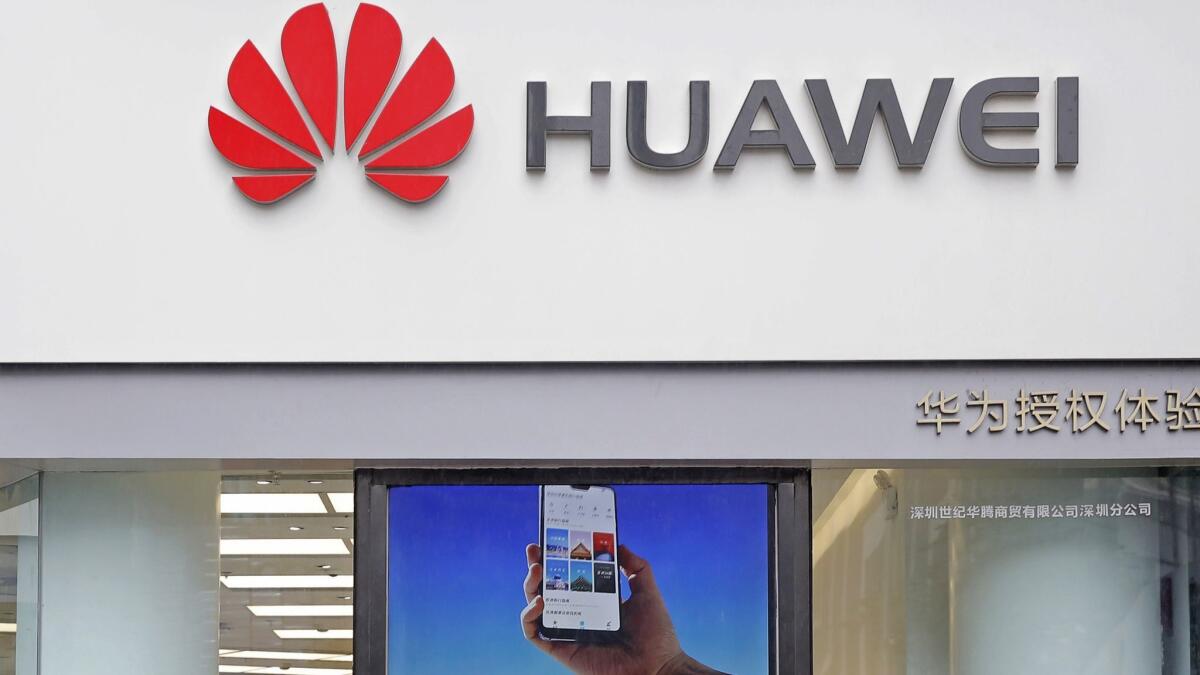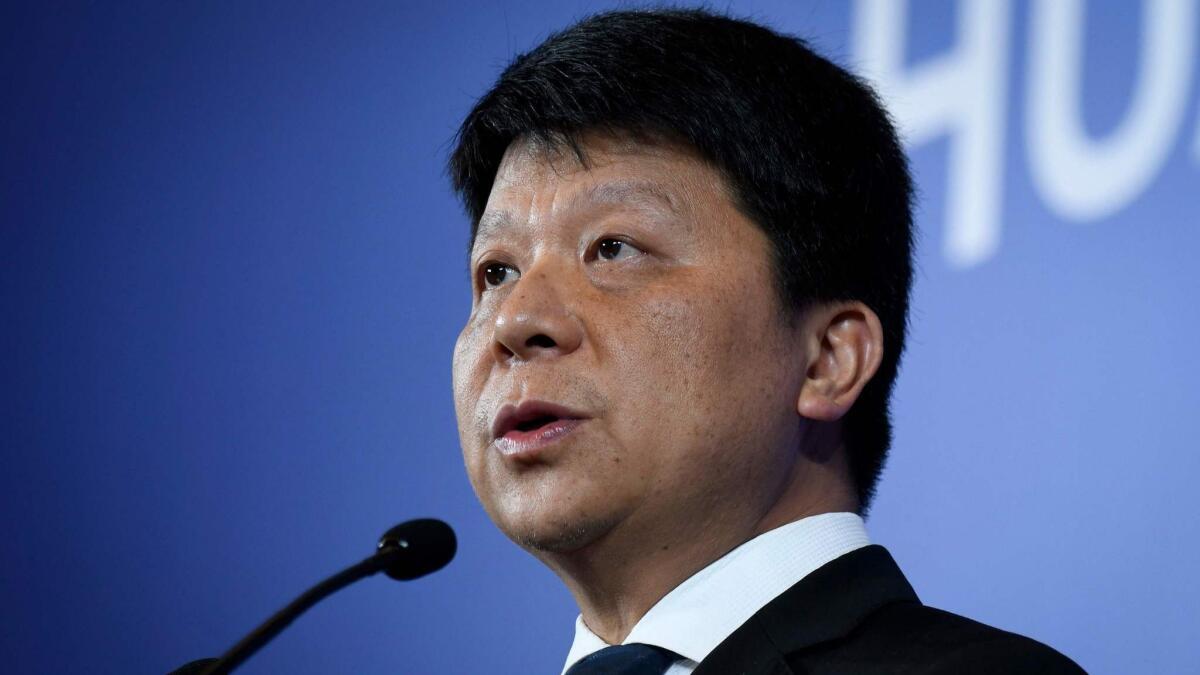Chinese tech giant Huawei sues the U.S. in Texas in pushback against security risk claims

Reporting from Beijing — Huawei is suing the U.S. government over a law banning federal agencies from using its equipment, the latest maneuver in the Chinese tech giant’s global offensive against American pressure and criticism that it poses a national security risk.
Huawei’s inexpensive, effective technology is attractive to many countries planning 5G wireless networks, but U.S. officials have been touring the world arguing it poses an unacceptable security risk, particularly for allies with which the U.S. shares intelligence.
The White House says Beijing could exploit the technology to carry out cyberspace intrusions and espionage, and Vice President Mike Pence and Secretary of State Michael R. Pompeo recently warned European partners not to use Huawei to equip 5G networks.
But Huawei, desperate to protect its share of a crucial market, has been fighting back.
“Congress acted unconstitutionally as judge, jury and executioner,” Huawei executive Guo Ping said Thursday after announcing the court action.
The lawsuit filed in federal court in Plano, Texas — home to Huawei’s U.S. headquarters — targets a U.S. ban on government agencies using its equipment or dealing with third parties that use its equipment.
“The U.S. Congress has repeatedly failed to produce any evidence to support its restrictions on Huawei products,” Guo said at a news conference in Shenzhen, China.
At the Mobile World Congress in Barcelona, Spain, last week, Huawei boasted it had already signed up 64 countries for 5G equipment. Governments in important markets such as Britain, Germany, Canada and India are still deciding, and some telecommunications firms in France, Japan, Germany and Britain have expressed concerns about using Huawei technology in their 5G networks.
Huawei has been trying to shrug off its reputation for having a closed, opaque corporate culture. In Brussels this week, the company launched a cybersecurity transparency center. It has taken to social media and recently launched the English-language website Huawei Facts with an “Open Letter to the U.S. Media,” saying, “Don’t believe everything you hear. Come and see us.”
Huawei has also been wooing journalists, according to Reuters, which reported that 10 of its senior staffers were offered salaries of up to $200,000 to jump ship and work for Huawei’s public relations department.
It took out a full-page ad in New Zealand newspapers after that country barred its equipment from 5G networks. And it paid for a sponsored column by cybersecurity analyst Henry B. Wolfe published by the New York Times’ T Brand Studio calling on Australia to reverse a similar ban.
The company has urged its foreign employees to post glowing comments about Huawei, to send the company headquarters any positive commentary they can find online and to share the Huawei Facts website and Twitter handle with clients, customers and partners.
Last week, a slick video featuring schoolchildren singing “Huawei Is Beautiful” circulated on Chinese social media; the company said the video was made by supporters on the internet without its participation. Huawei “appreciates customers’ attentions and concerns,” a company statement said.

In his news conference at Huawei’s Chinese headquarters, Guo, who serves in the company’s rotating chairmanship, accused U.S. agencies of hacking Huawei servers and stealing emails and source code.
The allegation that the National Security Agency hacked Huawei’s servers in 2007 surfaced in 2014, based on documents leaked by former NSA contractor Edward Snowden.
Huawei is not the first company the U.S. government has barred over national security concerns. In September 2017, government agencies were barred from using software from the Russian cybersecurity company Kaspersky Lab. The company sued, but its case was dismissed.
Chinese Foreign Ministry spokesman Lu Kang said Thursday that he was unaware of Huawei’s legal action against the U.S. government but that it was “totally reasonable and totally understandable.”
Concern about Huawei is based partly on a 2017 Chinese law requiring Chinese companies to cooperate with that country’s national security agency.
Huawei founder Ren Zhengfei has said he would rather close the company than compromise clients’ security or give national security officials access to data.
But European Commission Vice President Andrus Ansip has said that Huawei being subject to China’s national security authorities was troubling. He said at a news conference last month that the task was not to look for evidence of past breaches by Huawei but to assess the risk of a future threat, Reuters reported.
Former Australian Prime Minister Malcolm Turnbull — who led the government when it barred Huawei and another Chinese company, ZTE, from participating in its 5G rollout — gave much the same assessment Tuesday during a speech in London.
“It is important to remember that a threat is the combination of capability and intent,” he said. “Capability can take years, decades, to develop and in many cases won’t be attainable at all. But intent can change in a heartbeat.”
Australia is part of the “Five Eyes” network with which the U.S. shares intelligence, including Britain, Canada and New Zealand. Turnbull said pressure from Washington played no part in Australia’s decision on Huawei.
Huawei has been at the center of accusations of intellectual property theft from U.S. companies, a core grievance in the U.S.-China trade war. In January, U.S. prosecutors indicted the company in two cases — over allegations of intellectual property theft and fraud over hidden dealings with Iran. They accused Ren of repeatedly lying to U.S. officials over business dealings in Iran in breach of U.S. sanctions.
Huawei executive Meng Wanzhou, Ren’s daughter, was arrested in Canada in December and has been indicted by the U.S. on charges of fraud over business dealings in Iran. She faces a May 8 extradition hearing in Vancouver in a case that has outraged Chinese officials. Meng is suing Canadian authorities over what she alleges were breaches of her rights during her arrest.
The vehemence of Chinese officials’ reaction to Meng’s arrest has raised questions about the closeness of company executives to state officials.
China’s pressure on Canada to release Meng was swift and intense. Chinese authorities arrested two Canadians, whom it has accused of stealing state secrets, and boosted the 15-year drug sentence of another Canadian to the death penalty. Authorities this week banned imports of Canadian canola seeds by a major supplier.
Meng’s lawyer Richard Peck raised concerns in a Vancouver court Wednesday that the U.S. case against her is politically motivated. He also suggested her arrest involved abuse of process.
He raised comments by President Trump, who said in December that he would be willing to intervene in the Meng case if it helped secure a trade deal.
New Zealand, which banned Huawei from its rollout of a 5G network, and Australia have seen recent actions from China that some suspect may have been in retaliation.
A New Zealand commercial airliner was turned back on its way to China for “technical reasons” because it lacked registration, Australian coal shipments to a Chinese port were delayed for “quality checks” and an Australian writer was arrested in China.
Meanwhile, news came that Australia’s Parliament had been hacked by a “sophisticated state actor,” although the country’s identity has not emerged.
Twitter: @RobynDixon_LAT
More to Read
Sign up for Essential California
The most important California stories and recommendations in your inbox every morning.
You may occasionally receive promotional content from the Los Angeles Times.










